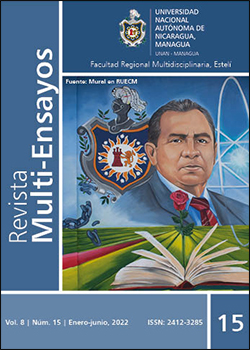The new approach to university extension as an instrument of linkage towards vulnerable sectors in the Faculty of Economic Sciences of the National University of Asunción. Year 2020
DOI:
https://doi.org/10.5377/multiensayos.v8i15.13189Keywords:
University extension, linking, vulnerable sectorsAbstract
This article outlines the preponderant role that the Academy can fulfill during this Pandemic with the articulation of university extension activities so that students can apply the knowledge acquired in situations of the surrounding reality, especially towards vulnerable sectors of the community. That is why this article addresses the new approach given to university extension activities as a fundamental tool for higher education to attend to the needs of the population and to position itself in the minds of citizens as an institution that is not only a professional training institution, but also become a concrete laboratory of positive actions for society. For this, the main activities that the Faculty of Economic Sciences of the National University of Asunción has implemented, through university extension, were analyzed, evidencing the need to propose an effective procedure to guarantee that the programs developed with vulnerable sectors since 2017 they were not suspended in the year 2020 of the COVID19 Pandemic; which was achieved with the adoption of a change of focus of the university extension effectively.
Downloads
428
HTML (Español (España)) 615
Published
How to Cite
Issue
Section
License
Copyright (c) 2022 Revista Multi-Ensayos

This work is licensed under a Creative Commons Attribution-NonCommercial-ShareAlike 4.0 International License.

